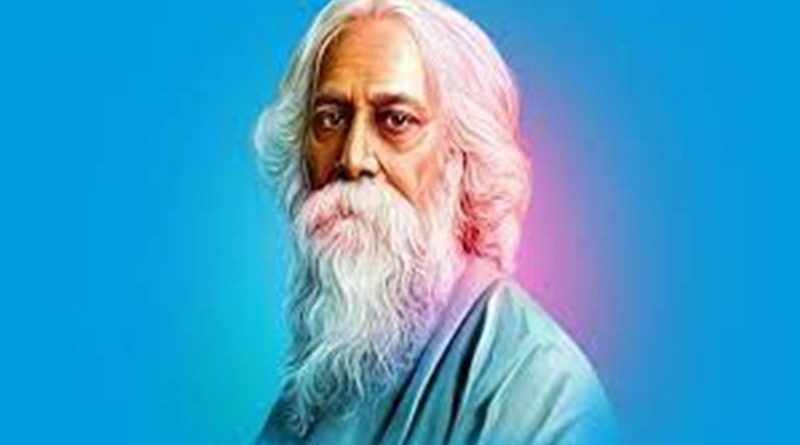JSC Unseen : Rabindranath Tagore
Read the text and answer questions 4 and 5.
| Rabindranath Tagore was one of the most leading poets in the history of world literature. He was bat the same time a poet, a novelist, a dramatist, a philosopher and a musician.
He was born into the renowned Tagore family in May, 1861. After the completion of his house education, he was sent to school. Bu he did not like institutional education. So, arrangements were made at house for his proper education. In his thirteenth year, Rabindranath along with his father went to visit Himalayas. At the age of seventeen, he was sent to London to study law. But he studied literature with Professor Henry Morely only for a few months and then returned home. Only at the age of eight, he started composing poems. He wrote his poetic novel ‘Banaphul’ at the age of fifteen. When he was sixteen, his poems and essays were being published in journals. After returning from England, he began to write tirelessly in all branches of literature. In 1911, he translated his poems of “The Gitanjali” into english which brought him the highest honour in the form of the Nobel Prize in 1913. One year after his awarding the Nobel Prize, he was made a Knight by the British Government which he rejected as a protest against the atrocities of British Government at Jalianwalabagh. The University of Oxford honoured him with D. Litt. In 1940. Earlier in 1921, he laid the foundation of Viswa Bharati. At the age of eighty, Rabindranath Tagore breathed his last. |
| বিশ্ব সাহিত্যের ইতিহাসে রবীন্দ্রনাথ ঠাকুর ছিলেন অন্যতম প্রধান কবি। তিনি একই সাথে একজন কবি, একজন ঔপন্যাসিক, একজন নাট্যকার, একজন দার্শনিক এবং একজন সঙ্গীতজ্ঞ ছিলেন।
তিনি ১৮৬১ সালের মে মাসে বিখ্যাত ঠাকুর পরিবারে জন্মগ্রহণ করেন। গৃহশিক্ষা শেষ করার পর তাকে স্কুলে পাঠানো হয়। তিনি প্রাতিষ্ঠানিক শিক্ষা পছন্দ করতেন না। তাই বাড়িতেই তার যথাযথ শিক্ষার ব্যবস্থা করা হয়। ত্রয়োদশ বছরে বাবার সঙ্গে রবীন্দ্রনাথ হিমালয় ভ্রমণে যান। সতেরো বছর বয়সে তাকে আইন অধ্যয়নের জন্য লন্ডনে পাঠানো হয়। কিন্তু তিনি অধ্যাপক হেনরি মোরেলির কাছে মাত্র কয়েক মাস সাহিত্য অধ্যয়ন করেন এবং তারপর দেশে ফিরে আসেন। মাত্র আট বছর বয়সে তিনি কবিতা রচনা শুরু করেন। পনের বছর বয়সে তিনি রচনা করেন তাঁর কাব্য উপন্যাস ‘বনফুল’। তাঁর বয়স যখন ষোল, তখন তাঁর কবিতা ও প্রবন্ধ পত্রিকায় প্রকাশিত হতে থাকে। ইংল্যান্ড থেকে ফিরে এসে সাহিত্যের সব শাখায় অক্লান্তভাবে লিখতে শুরু করেন। ১৯১১ সালে, তিনি তার “গীতাঞ্জলি” কবিতাগুলি ইংরেজিতে অনুবাদ করেছিলেন যা তাকে ১৯১৩ সালে নোবেল পুরস্কারের আকারে সর্বোচ্চ সম্মান এনে দেয়। নোবেল পুরষ্কার পাওয়ার এক বছর পর, ব্রিটিশ সরকার তাকে নাইট বানিয়েছিল যা তিনি জালিয়ানওয়ালাবাগে ব্রিটিশ সরকারের নৃশংসতার প্রতিবাদ হিসাবে প্রত্যাখ্যান করেছিলেন। অক্সফোর্ড বিশ্ববিদ্যালয় তাকে ডি. লিট উপাধিতে সম্মানিত করে। ১৮৪০ সালে। এর আগে ১৯২১ সালে তিনি বিশ্বভারতীর ভিত্তি স্থাপন করেন। আশি বছর বয়সে রবীন্দ্রনাথ ঠাকুর শেষ নিঃশ্বাস ত্যাগ করেন। |
4. Complete the grid below with appropriate information.
| Who/What | Event/ Activity | Where/Institute | When |
| Rabindranath Tagore | born | (i)————– | in 1861 |
| He | visited | Himalayas | (ii)——— |
| He | (iii) ——— | London | in 1878 |
| He | (iv) ———- | in 1911 | |
| Poems and essays | publication | journals | (v)——— |
- Read the passage again and write, whether the statements are true or false. Give correct answer if the statement is false.
(a) Rabindranath Tagore began to write all branches of literature after coming back from America.
(b) He translated his poems of “The Gitanjali” into English in 1911.
(c) Tagore was awarded Nobel Prize in 1913.
(d) At the age of seventeen, he was sent to the USA to study law.
(e) ‘Banaphul’ is a drama written by Rabindranath Tagore.

